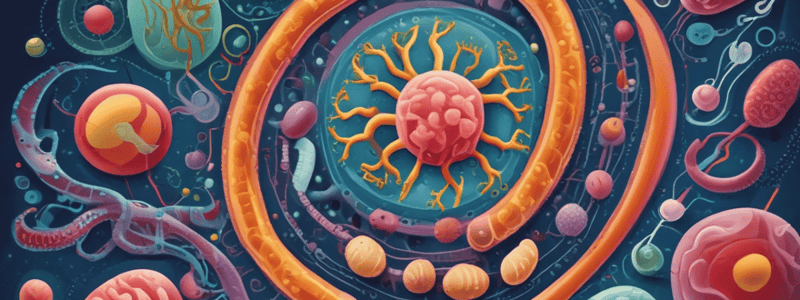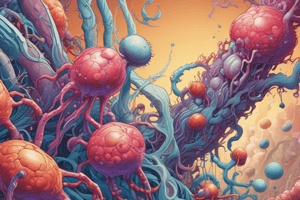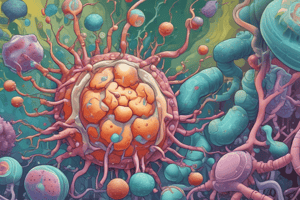Podcast
Questions and Answers
What is the primary mechanism of action of aminoglycosides?
What is the primary mechanism of action of aminoglycosides?
- Inhibition of RNA transcription
- Inhibition of DNA replication
- Inhibition of protein synthesis (correct)
- Inhibition of cell wall formation
Which of the following is a common adverse effect of aminoglycosides?
Which of the following is a common adverse effect of aminoglycosides?
- Hepatotoxicity
- Ototoxicity (correct)
- Nephrotoxicity (correct)
- Cardiotoxicity
What is the purpose of monitoring serum levels of aminoglycosides?
What is the purpose of monitoring serum levels of aminoglycosides?
- To ensure adequate renal clearance and prevent toxicity (correct)
- To monitor for bacterial resistance
- To adjust the dosage of the antibiotic
- To determine the minimum inhibitory concentration (MIC)
What is the primary mechanism of action of quinolones?
What is the primary mechanism of action of quinolones?
Which of the following is a common interaction with quinolones?
Which of the following is a common interaction with quinolones?
What is the black box warning associated with quinolones?
What is the black box warning associated with quinolones?
What is the primary site of infection for Mycobacterium tuberculosis?
What is the primary site of infection for Mycobacterium tuberculosis?
Which of the following antibiotics is used to treat protozoal infections?
Which of the following antibiotics is used to treat protozoal infections?
Which of the following organisms is resistant to all beta-lactam antibiotics and aztreonam?
Which of the following organisms is resistant to all beta-lactam antibiotics and aztreonam?
What is the primary concern regarding MRSA infections?
What is the primary concern regarding MRSA infections?
What is the term for the nodular accumulations of inflammatory cells that are delimited by clear boundaries and have a cheesy or caseated consistency in the lungs?
What is the term for the nodular accumulations of inflammatory cells that are delimited by clear boundaries and have a cheesy or caseated consistency in the lungs?
Which of the following aminoglycosides is an exception to the poor oral absorption rule?
Which of the following aminoglycosides is an exception to the poor oral absorption rule?
What is the term for the chronic form of tuberculosis?
What is the term for the chronic form of tuberculosis?
Which antibiotic is indicated for the treatment of antibiotic-induced colitis and staphylococcal enterocolitis?
Which antibiotic is indicated for the treatment of antibiotic-induced colitis and staphylococcal enterocolitis?
What is the primary mechanism of action of aminoglycosides?
What is the primary mechanism of action of aminoglycosides?
What is the primary indication for the use of aminoglycosides?
What is the primary indication for the use of aminoglycosides?
What is the primary drug used to treat tuberculosis?
What is the primary drug used to treat tuberculosis?
What is the consequence of the use of carbapenems to treat ESBL-producing organisms?
What is the consequence of the use of carbapenems to treat ESBL-producing organisms?
What is the primary reason for the resurgence of tuberculosis cases in the United States in 1992?
What is the primary reason for the resurgence of tuberculosis cases in the United States in 1992?
What is the main concern regarding multidrug-resistant tuberculosis (MDR-TB)?
What is the main concern regarding multidrug-resistant tuberculosis (MDR-TB)?
What is the purpose of performing an acid-fast bacillus smear test on sputum?
What is the purpose of performing an acid-fast bacillus smear test on sputum?
Why is Bacille Calmette-Guérin (BCG) vaccine not used in the United States?
Why is Bacille Calmette-Guérin (BCG) vaccine not used in the United States?
What is the main goal of antitubercular drug therapy?
What is the main goal of antitubercular drug therapy?
Why is it important to perform drug-susceptibility testing on the first Mycobacterium spp. isolated from a patient specimen?
Why is it important to perform drug-susceptibility testing on the first Mycobacterium spp. isolated from a patient specimen?
Why is patient education critical in tuberculosis treatment?
Why is patient education critical in tuberculosis treatment?
What should patients be instructed to avoid while taking rifampin?
What should patients be instructed to avoid while taking rifampin?
Why may pyridoxine be needed in patients taking INH therapy?
Why may pyridoxine be needed in patients taking INH therapy?
What should be monitored in patients taking tuberculosis medications?
What should be monitored in patients taking tuberculosis medications?
What is a potential consequence of rifampin therapy?
What is a potential consequence of rifampin therapy?
Why should patients taking rifampin use an alternative form of birth control?
Why should patients taking rifampin use an alternative form of birth control?
What is the importance of taking tuberculosis medications at the same time every day?
What is the importance of taking tuberculosis medications at the same time every day?
Why should patients be instructed to take care of themselves during tuberculosis treatment?
Why should patients be instructed to take care of themselves during tuberculosis treatment?
What should be monitored to confirm clinical findings in tuberculosis treatment?
What should be monitored to confirm clinical findings in tuberculosis treatment?
What should be reported to the prescriber immediately in patients taking tuberculosis medications?
What should be reported to the prescriber immediately in patients taking tuberculosis medications?
What is the primary mechanism of action of bedaquiline?
What is the primary mechanism of action of bedaquiline?
Why is it important to monitor liver function tests when administering isoniazid?
Why is it important to monitor liver function tests when administering isoniazid?
What is a common interaction between rifampin and oral contraceptives?
What is a common interaction between rifampin and oral contraceptives?
What is a common adverse effect of rifampin?
What is a common adverse effect of rifampin?
Why is it important to educate clients taking rifampin about oral contraceptives?
Why is it important to educate clients taking rifampin about oral contraceptives?
What is a common contraindication for the use of isoniazid?
What is a common contraindication for the use of isoniazid?
Flashcards are hidden until you start studying
Study Notes
Multidrug-Resistant Organisms
- Organisms that are resistant to one or more classes of antimicrobial drugs
- Examples:
- Methicillin-resistant Staphylococcus aureus (MRSA)
- Vancomycin-resistant Enterococcus (VRE)
- Organisms producing extended-spectrum beta-lactamases (ESBLs)
- Carbapenem-resistant Enterobacteriaceae (CRO)
MRSA
- Threat of MRSA becoming resistant to all antibiotics currently available
- No longer seen just in hospitals; it has spread to the community setting
- Approximately 50% of staphylococcal infections contracted in the community involve MRSA
ESBL
- Organisms that produce ESBL are resistant to all beta-lactam antibiotics and aztreonam
- Can be treated only with carbapenems or sometimes quinolones
- Use of carbapenems: resistance occurred; production of carbapenemase, which renders all carbapenems ineffective
- Other treatment options: tigecycline and colistimethate
Aminoglycosides
- Natural and semisynthetic
- Produced from Streptomyces spp.
- Poor oral absorption; no oral forms (exception: neomycin)
- Very potent antibiotics with serious toxicities
- Bactericidal; prevent protein synthesis
- Kill mostly gram-negative bacteria; some gram-positive bacteria
- Examples:
- Gentamicin
- Neomycin (Neo-Fradin)
- Tobramycin (TOBI)
- Amikacin
Quinolones
- Also called fluoroquinolones
- Excellent oral absorption
- Absorption reduced by antacids
- Effective against gram-negative organisms and some gram-positive organisms
- Examples:
- Ciprofloxacin (Cipro)
- Norfloxacin (Noroxin)
- Levofloxacin (Levaquin)
- Moxifloxacin (Avelox)
- Gemifloxacin (Factive)
- Delafloxacin (Baxdela)
Mechanism of Action of Quinolones
- Bactericidal
- Alter DNA of bacteria, causing death
- Do not affect human DNA
- Used to treat S.aureus, Serratia marcescens, and Mycobacterium fortuitum
Adverse Effects of Quinolones
- CNS: headache, dizziness, insomnia, depression, restlessness, convulsions
- GI: nausea, vomiting, diarrhea, constipation, thrush, increased liver function study results
- Cardiac: prolonged QT interval
- Integumentary: rash, pruritus, urticaria, flushing
- Other: ruptured tendons, tendonitis, fever, chills, blurred vision, tinnitus
Tuberculosis (TB)
- Caused by Mycobacterium tuberculosis
- Antitubercular drugs treat all forms of Mycobacterium (MTB)
- TB is most commonly characterized by granulomas in the lungs: nodular accumulations of inflammatory cells
- Infections:
- Common infection sites: lung, brain, bone, liver, kidney, genitourinary tract
- Aerobic bacillus
- Passed from infected humans, cows (bovine), and birds (avian)
- Tubercle bacilli are conveyed by droplets
Antitubercular Drugs
- First-line drugs:
- INH
- Rifapentine
- Ethambutol
- Rifabutin
- Pyrazinamide (PZA)
- Rifampin
- Streptomycin
- Second-line drugs:
- Bedaquiline
- Capreomycin
- Cycloserine
- Levofloxacin
- Ethionamide
- Ofloxacin
- Kanamycin
- Para-aminosalicylic acid (PAS)
Diagnosis of TB
- Step 1: Tuberculin skin test (Mantoux test)
- Step 2: If skin test results are positive, then chest x-ray
- Step 3: If chest x-ray shows signs of tuberculosis, then culture of sputum or stomach secretions
Multidrug-Resistant Tuberculosis (MDR-TB)
- TB infects one-third of the world's population
- MDR-TB that is resistant to both isoniazid (INH) and rifampin
- Extensively drug-resistant tuberculosis (XDR-TB): relatively rare type of MDR-TB, resistant to almost all drugs used to treat TB
Bedaquiline (Sirturo)
- First drug approved in over 40 years for treatment of multidrug-resistant TB
- Inhibits mycobacterial ATP synthase
- Adverse effects: headache, chest pain, nausea, and QT prolongation
- Interactions: alcohol, mifepristone, other drugs with high risk for causing QT prolongation
Isoniazid (INH)
- Inhibits growth of mycobacteria by preventing synthesis of mycolic acid in the cell wall
- Indications: for active and latent tuberculosis
- Metabolized in the liver through acetylation—watch for "slow acetylators"
- Used alone or in combination with other drugs
- Contraindicated with liver disease; monitor ALT, AST
Adverse Effects of Isoniazid (INH)
- Peripheral neuropathy: tingling, numbness, binding, and pain resulting from deficiency of pyridoxine (vitamin B6)
- Hepatotoxicity: anorexia, malaise, fatigue, nausea, and yellowish discoloration of skin and eyes
- Monitor liver function tests; if elevated, may result in need to discontinue medication and avoid alcohol consumption
Studying That Suits You
Use AI to generate personalized quizzes and flashcards to suit your learning preferences.




